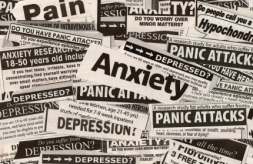 “How are you?” “I’m falling apart!“ might be our inner cry, but we often say “Fine,” without a hitch. How often do we think of what that question sounds like to someone who is not fine – to someone who is not “mentally” well? Do they always realize that they are not well? And if so, are they comfortable telling others or even getting help?
“How are you?” “I’m falling apart!“ might be our inner cry, but we often say “Fine,” without a hitch. How often do we think of what that question sounds like to someone who is not fine – to someone who is not “mentally” well? Do they always realize that they are not well? And if so, are they comfortable telling others or even getting help?
Rev. Dr. Otis Moss, III of Trinity Unity Church of Christ (TUCC) in Chicago recently shared “Losing Daphne” with Ebony Magazine – a painful and true heart-drenching saga of his sister’s tumultuous struggle with her mental health. Her battle was with paranoid schizophrenia with delusions and hearing things that weren’t real. Pastor Moss recounts, “I heard her talking to herself. Whispers through the walls, the sounds of sadness, anger and pain leaked into my bedroom. She fought at night with invisible demons and tricksters. One night, laughter; the next, cries of desperation.” His sister, Daphne, committed suicide when she was thirty-three years old.
I was also surprised by the Mayo Clinic staff who categorized paranoid schizophrenia as one of the forms that leaves patients with more daily functionality with less problems with memory, concentration or dulled emotions. Medication can treat 80% of schizophrenia case’s acute symptoms but only half of these patients seek help. “Still, paranoid schizophrenia is a serious, lifelong condition that can lead to many complications, including suicidal behavior” they explain. Generally, over one million people take their own lives annually worldwide and at least 20 million attempt it at least once.
Illnesses vary. Anxiety as well as panic, are normal emotions. But when they escalate into “attacks”, they can become anxiety or panic disorders. Depression is common but can become a serious mental illness that many overlook as “normal”. Additionally, an accompanied drug addiction can make any of these disorders more difficult to treat but some treatment is available for “dual diagnosis”. Many students, including elementary and high school students don’t know where to go for help for mental problems. Click here for an information sheet.
At the college level, many don’t use the help provided! Of the students surveyed by the National Union of Students (NUS), “one in five say they experienced mental health problems while at the university….More than a quarter (26%) of students who say they experience mental health problems do not get treatment and only one in 10 use counseling services provided by their university.” Purdue University and many others have resources for suicide prevention (SP). University of Louisville provides SP training. At Yale University, a Back to Campus toolkit is available that includes fact sheets for students and information for colleges and universities about what types of services should be accessible.
Some under-graduate and graduate students at private universities participated in a study and were examined for mental disorders, their thoughts of suicide, injuring themselves  and thoughts of injuring others. “The participants took part in interviews and completed two tests to assess their depression and anxiety levels. Between 1998 and 2009, the number of students coming into counseling who were diagnosed with at least one mental disorder increased 3 percent, from 93 percent to 96 percent. The percentage diagnosed with moderate to severe depression increased from 34 percent to 41 percent,” said John Guthman, Director of Student Counseling Services at Hofstra University in New York.
and thoughts of injuring others. “The participants took part in interviews and completed two tests to assess their depression and anxiety levels. Between 1998 and 2009, the number of students coming into counseling who were diagnosed with at least one mental disorder increased 3 percent, from 93 percent to 96 percent. The percentage diagnosed with moderate to severe depression increased from 34 percent to 41 percent,” said John Guthman, Director of Student Counseling Services at Hofstra University in New York.
Training is imperative. President Obama’s budget is encouraging as it proposed $235 million to fund mental health initiatives. Of the funds, $130 million will be used to train teachers and others to identify signs of mental illness in students and provide them with access to treatment. Secretary of Health and Human Services, Kathleen Sebelius stated that $205 million would help identify mental health problems, improve access to mental health services and support safer school environments. The plan would affect at least 8,000 schools. Another $50 million would train 5,000 people to become mental health experts at the master’s level to help alleviate the shortage that will likely be magnified with the Affordable Care Act. Sixty percent of people with mental health conditions go untreated.
“Research shows that youth with untreated mental disorders are more likely to have difficulty in school, including discipline problems and failing grades, and to get into trouble with the law,” mental health advocates said. National PTA supports the Mental Health in Schools Act of 2013 introduced in February by U.S. Senator Al Franken (D-MN). National PTA believes that all children and youth have the right to mental health support services. The Mental Health in Schools Act would establish a grant program to help school districts form innovative community partnerships and train school staff, volunteers, families, and other members of the community to recognize the signs of child and adolescent behavioral health problems and refer them for appropriate services. Other cosponsors of the bill included Senators Durbin (IL), Blumenthal (CT), Stabenow (MI), Brown (OH), Schumer (NY), etc. Click here to track this bill. Click here to contact your legislators.
If you or someone you know needs help, please call the Substance Abuse and Mental Health Services Administration Disaster Distress Helpline: 1-800-985-5990 or the National Suicide Prevention Lifeline: 1-800-273-TALK (8255).”
Related articles
- Mental Health Stigma – Does it Add Up? (whereistandblog.wordpress.com)
- The Grinch that Stole Christmas and Stole LIVES
- Liptember – Awareness for mental health issues for women *HELP* (prayingforoneday.wordpress.com)
- Brookhaven Retreat Observes Suicide Prevention Week (prweb.com)
- Schizophrenia Genetics in Science: SNPs Are Only One Piece of the Puzzle (23andme.com)
- Mental Health Problems and ATOS (midsummersnightsdreamangie.wordpress.com)


Reblogged this on Debate and Switch's Blog and commented:
September 10th is National Suicide Prevention Awareness Day! Please share this valuable information to help those in our families and communities who might benefit.
LikeLike